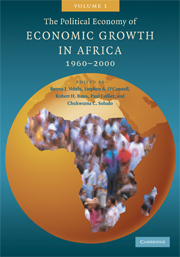Book contents
- Frontmatter
- Contents
- List of figures
- List of tables
- List of contributors
- Foreword
- List of acronyms
- PART 1 OVERVIEW
- PART 2 INTERPRETATION
- 4 Domestic interests and control regimes
- 5 Sacrificing the future: intertemporal strategies and their implications for growth
- 6 The political geography of redistribution
- 7 Political conflict and state failure
- 8 Shocks, risk, and African growth
- PART 3 EXPLANATION
- PART 4 LOOKING AHEAD
- Index
- References
5 - Sacrificing the future: intertemporal strategies and their implications for growth
Published online by Cambridge University Press: 09 January 2010
- Frontmatter
- Contents
- List of figures
- List of tables
- List of contributors
- Foreword
- List of acronyms
- PART 1 OVERVIEW
- PART 2 INTERPRETATION
- 4 Domestic interests and control regimes
- 5 Sacrificing the future: intertemporal strategies and their implications for growth
- 6 The political geography of redistribution
- 7 Political conflict and state failure
- 8 Shocks, risk, and African growth
- PART 3 EXPLANATION
- PART 4 LOOKING AHEAD
- Index
- References
Summary
Introduction
This chapter focuses on a particular type of policy failure, namely the sacrifice of future income for present gain. All societies and their governments face a trade-off between present and future consumption, but in Africa this has often led to serious policy errors. The core phenomenon we discuss is an unsustainable boom in public spending. However, we also include a less common event, looting. Although fairly rare, when looting occurs its implications for growth have been substantial. Bouts of unsustainable public spending were usually, although not invariably, triggered by booms in revenues from natural-resource rents. These were often amplified by unsustainable debt accumulation. Looting of assets occasionally took the form of dispossession of private assets, but more commonly the target was publicly owned assets.
Both unsustainable public spending booms and asset looting were sometimes simply mistakes, but were more commonly rational strategies. Unsustainable strategies can be rational even though they are socially costly because many of the costs are external to the calculus of decision takers. In section 2, we discuss the episodes of unsustainable public spending, and in section 3 we turn to the looting episodes. As with all our syndromes, it is possible for a single episode to be characterized by multiple syndromes. Thus, the second Nigerian oil boom of 1979–83 features an unsustainable boom in public spending which took the form of looting, so that it is included in both sections.
Unsustainable public spending
Many African economies have remarkably undiversified export structures.
- Type
- Chapter
- Information
- The Political Economy of Economic Growth in Africa, 1960–2000 , pp. 202 - 224Publisher: Cambridge University PressPrint publication year: 2007
References
- 1
- Cited by



